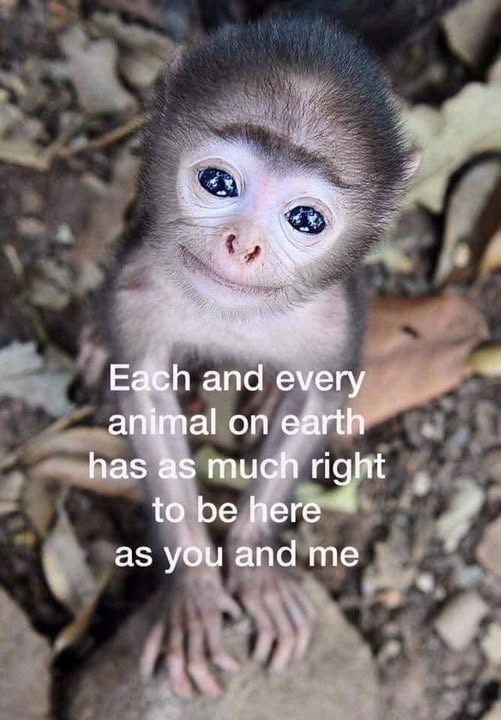The Silent Plea in Their Eyes: Recognizing Our Shared Right to Earth

Related Videos:
The gaze of this tiny monkey, captured so poignantly, is more than just a fleeting image. It’s a window into a profound truth, a gentle yet unwavering declaration: “Each and every animal on earth has as much right to be here as you and me.” This simple statement, overlaid on the photograph, resonates with a depth that calls for contemplation and, ultimately, action.

In our human-centric world, it’s easy to fall into the trap of believing in our own inherent superiority, to view other species as existing solely for our benefit or entertainment. We categorize, we exploit, and often, we forget that beneath the fur, the feathers, the scales, lies a living being with its own intricate life, its own needs, and its own intrinsic value.
This image challenges that ingrained perspective. Look closely at those eyes – wide, intelligent, perhaps even a little vulnerable. Do you not see a spark of life, a flicker of consciousness that mirrors our own? Can we truly claim a greater right to this Earth than this creature, or the soaring eagle, the silent fish in the ocean depths, or the smallest insect diligently going about its task?

The concept of a “right to be here” is fundamental. It speaks to the inherent value of existence, independent of utility or human appreciation. Every organism plays a role in the delicate balance of our planet’s ecosystems. From the microscopic bacteria that enrich the soil to the apex predators that regulate populations, each contributes to the complex web of life that sustains us all. When we diminish or extinguish a species, we are not just losing a beautiful creature; we are unraveling the intricate threads of this web, often with unforeseen and potentially devastating consequences.

Consider the sheer diversity of life that graces our planet. Millions of species, each a unique masterpiece of evolution, honed over millennia to thrive in their specific niches. To believe that only one of these species – our own – possesses an inherent right to existence is not only arrogant but demonstrably short-sighted. We rely on the natural world for our very survival – for the air we breathe, the water we drink, the food we eat, and countless other resources we often take for granted. To disregard the well-being of other species is, in essence, to jeopardize our own future.
Furthermore, the capacity for suffering is not独占by humankind. Animals feel pain, fear, stress, and even joy and affection. To inflict unnecessary harm or to deny them basic needs is a moral failing. Recognizing their right to exist compels us to consider the ethical implications of our actions, from the food we consume to the way we develop land and manage natural resources.

This isn’t about romanticizing wildlife or placing animals above human needs. It’s about acknowledging our interconnectedness and fostering a sense of responsibility. It’s about finding a way to coexist peacefully and sustainably, recognizing that we share this planet and its finite resources.
The message conveyed by this image is particularly poignant in a time of unprecedented environmental challenges. Habitat loss, climate change, pollution, and overexploitation are driving species to extinction at an alarming rate. In the face of such devastation, the simple truth “Each and every animal on earth has as much right to be here as you and me” becomes a powerful call to action.

It urges us to:
- Cultivate Empathy: To look beyond our own species and try to understand the world from the perspective of other living beings.
- Promote Conservation: To support efforts that protect habitats, reduce pollution, and combat climate change.
- Make Ethical Choices: To consider the impact of our consumption and lifestyle on the animal kingdom.
- Advocate for Change: To support policies and practices that prioritize the well-being of all life on Earth.
- Educate Ourselves and Others: To raise awareness about the importance of biodiversity and our role in its preservation.

The gentle gaze of this little monkey serves as a powerful reminder. We are not alone on this planet. We are part of a vast and wondrous tapestry of life, and every thread, every creature, has its own intrinsic value and its own right to be here. Let us embrace this truth and strive to create a world where all living beings can thrive, a world where those innocent eyes can look upon a future filled with hope and safety. For in recognizing their right to exist, we ultimately safeguard our own.











